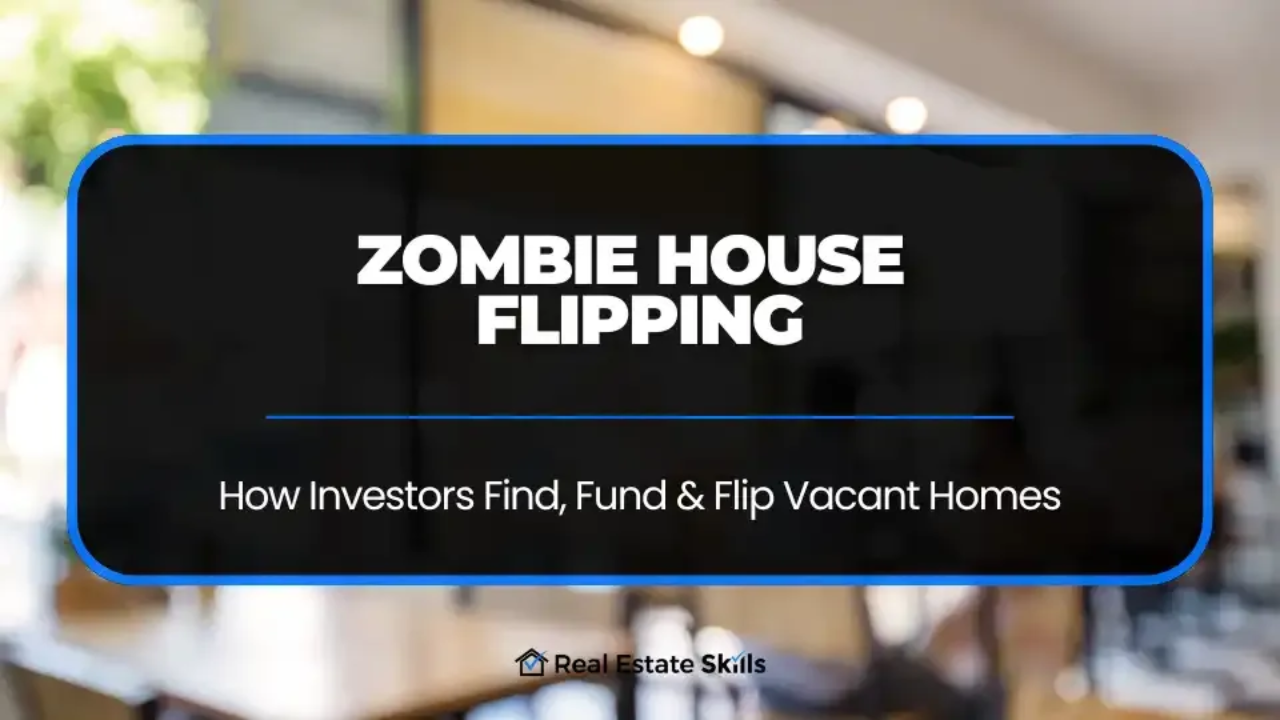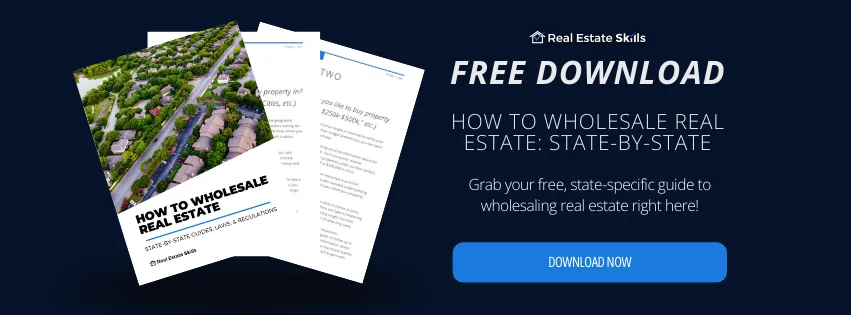
Zombie House Flipping: How Investors Profit From Vacant & Abandoned Homes
Sep 12, 2025
- What: “Zombie” properties are vacant homes stuck in limbo (often pre-foreclosure, tax-delinquent, or estate) with unclear upkeep or ownership action—prime for value-add deals.
- Why: Less buyer competition, bigger spreads, and motivated decision-makers (lienholders, heirs, out-of-area owners) willing to trade price for speed and certainty.
- How: Build targeted lists → verify occupancy & title → estimate ARV/repairs → secure access & contract → choose exit (flip, wholetail, or wholesale) → fund, rehab, and resell with a tight timeline and clean title.
Note: Local rules vary. This guide is for education only—consult a real estate attorney, broker, and CPA in your market.
Vacant, neglected homes don’t just drag down a street—they can be your next profitable project. This guide to zombie house flipping shows you exactly how to spot opportunity, underwrite it conservatively, and choose the right exit so you can turn “problem houses” into wins for your business and the neighborhood.
Browse the sections below and jump straight to what you need—whether you’re building a pipeline, tightening due diligence, or mapping funding and exits.
- What Is a Zombie House?
- Zombie vs. Other Distressed Properties
- How to Find Zombie Houses (Lists, Signs & Signals)
- Due Diligence: Title, Liens, Code & Occupancy
- Analyze the Numbers (ARV, Repairs, MAO)
- Acquisition: Contact, Access & Contract
- Exit Strategies: Wholesale, Wholetail, Full Flip
- Funding Options
- Rehab & Project Management
- Selling the Finished Deal
- Compliance, Safety & Ethics
- FAQs
If you’re serious about doing your first real estate deal, don’t waste time guessing what works. Our FREE Training walks you through how to consistently find deals, flip houses, and build passive income—without expensive marketing or trial and error.
This FREE Training gives you the same system our students use to start fast and scale smart. Watch it today—so you can stop wondering and start closing.
What Is a Zombie House?
A “zombie house” is a vacant residential property that’s fallen into neglect—often during pre-foreclosure, tax delinquency, probate, or after an owner’s long absence. Because no one is actively maintaining it, obvious signs (overgrown yard, boarded windows, mail pile-ups) appear while legal ownership and next steps remain unresolved.
For investors, zombie house flipping means acquiring distressed but fixable inventory, solving the underlying problem (title issues, liens, repairs), and reselling at a retail or landlord-ready price. The edge: reduced competition and room for value creation—if you underwrite and manage risk well.
Zombie vs. Other Distressed Properties
| Type | Core Signal | Common Hurdle |
|---|---|---|
| Zombie (Vacant) | Visible vacancy + neglect | Access, unknown repairs, code fines |
| Pre-Foreclosure | NOD/Lis Pendens filed | Short timelines, lender coordination |
| Tax-Delinquent | Unpaid property taxes | Redemption windows, auctions |
| Estate/Probate | Owner deceased/heirs involved | Authority & paperwork (PR letters) |
| REO | Bank-owned post-auction | Institutional process, fewer discounts |
How to Find Zombie Houses (Lists, Signs & Signals)
- Data lists: Absentee owners with long ownership, returned mail, utility shutoff indicators, code violations, tax-delinquent, pre-foreclosure, USPS “vacant” flags.
- Drive for dollars: Overgrowth, boarded windows, tarped roofs, notices on doors, full mailboxes, no curtains/lights.
- Local sources: Code enforcement, neighborhood groups, mail carriers (within legal bounds), title reps, probate attorneys, property managers.
- Digital: Satellite/street-view checks, public notice portals, auction calendars, and online forums for neglected properties.
Postcard: “We’re buying homes in. As-is, no showings needed. Pick your close date. Call/Text: .”
Voicemail: “Saw the property at. We can handle clean-out/repairs and close quickly. If helpful, call
Compliance: Follow DNC/TCPA and local marketing rules; respect privacy and signage laws.
Due Diligence: Title, Liens, Code & Occupancy
- Title search: Mortgages, tax liens, mechanics’ liens, judgments, HOA estoppels, and survivorship issues.
- Municipal: Open permits, code violations, fines, water/utility liens; verify payoff and compliance steps.
- Ownership/authority: All owners on title? Estate/probate docs? LLC authority? Power of attorney validity?
- Occupancy & access: Confirm vacancy; if occupied (tenants/squatters), plan legal steps and timelines before closing.
- Insurance/safety: Vacant-home insurance for your hold; board-up or fence if needed; secure utilities for inspection.
Analyze the Numbers (ARV, Repairs, MAO)
Underwrite conservatively—zombie homes often need more work than is visible.
- ARV: Use 3–5 nearby comps (±15% sf, similar style), sold in 6–12 months; adjust for features.
- Repairs: Scope major systems first (roof, HVAC, electrical, plumbing, foundation), then cosmetics. Add 10–20% contingency.
- MAO (Maximum Allowable Offer): MAO = (ARV × BuyerDiscount) − Repairs − Fees/Costs − Profit.
ARV $320k • BuyerDiscount 0.74 • Repairs $55k • Closing/Holding $10k • Profit $30k → MAO ≈ $142k
Acquisition: Contact, Access & Contract
- Contact owner/decision-maker: Skip-trace owners/heirs; be empathetic and specific about solving the problem.
- Secure access: One supervised walkthrough may be all you get; bring a contractor; record photos/video.
- Contract terms: “As-is”, clear title, access for bids, realistic close date, assignability (or plan a double-close), EMD timeline, and seller-paid or shared closing costs.
- Disclosures: Lead-based paint (where applicable), known defects, HOA, municipal requirements.
*For in-depth training on real estate investing, Real Estate Skills offers extensive courses to get you ready to make your first investment! Attend our FREE Webinar Training and gain insider knowledge, expert strategies, and essential skills to make the most of every real estate opportunity that comes your way!
Exit Strategies: Wholesale, Wholetail, Full Flip
| Exit | When to Use | Pros/Cons |
|---|---|---|
| Wholesale | Strong buyer list; quick close needed | Fast fee / Limited upside |
| Wholetail | Light clean-up boosts price | Higher spread / Hold risk |
| Full Flip | Heavy rehab; retail margins | Max profit / Time & capital heavy |
New To Real Estate Wholesaling? Start Here First
If you’ve been thinking, “I just need someone to show me the moves,” that’s us. We’re the mentor you’re looking for, and you don’t have to wait. Grab our free, step-by-step PDF that shows you how to wholesale in any state—from legal basics to buyer lists, offers, and closing. It’s concise, actionable, and designed for your first deal. Download the free guide now:
Funding Options
- Cash/lines: Personal cash, HELOC, business lines for speed and flexibility.
- Hard money/bridge: Asset-based loans for purchase + rehab; expect points, fees, and draw schedules.
- Transactional funding: Same-day money for double-closes when assignments aren’t allowed.
- Private lenders/partners: Equity splits or debt notes; document terms, security, and timelines.
- Proof of funds (POF): Keep a fresh letter (≤30 days) matching your entity and sufficient for price plus closing costs.
Rehab & Project Management
- Scope: Prioritize health/safety and big-ticket systems, then kitchens/baths, curb appeal, and flooring/paint.
- Bids: Get 2–3 line-item bids; specify materials, timeline, and change-order process.
- Schedule: Sequence trades (demo → rough-ins → inspections → finishes); prevent idle time.
- Controls: Pay draws on milestones; document progress with photos; keep lien waivers.
Selling the Finished Deal
- Pricing: Use fresh comps; adjust for days-on-market and seasonality.
- Presentation: Professional photos, basic staging, clean landscaping, and clear seller disclosures.
- Channels: MLS with an investor-friendly agent, private buyers list, and local investor groups.
- Terms: Consider buyer concessions or rate buydowns if DOM stretches.
Compliance, Safety & Ethics
- Do: Use written permission before marketing property you don’t own; disclose assignment intent where required.
- Do: Follow fair-housing standards and honest advertising; comply with DNC/TCPA for calls/texts.
- Do: Use attorney-reviewed contracts; clear code issues and obtain required permits.
- Don’t: Trespass or enter without permission; ignore redemption/tenant rights; overpromise timeline or price.
Not legal or financial advice. Consult licensed professionals in your state.
Zombie House Flipping — FAQs
Quick answers to common questions about finding, funding, and flipping zombie properties.
What makes a house a “zombie” property?
It’s typically vacant and neglected, often amid pre-foreclosure, tax delinquency, or estate transition—no one is actively maintaining or moving it to market.
Is zombie house flipping legal?
Yes—provided you follow local laws, use proper contracts and disclosures, and respect title, lien, tenant, and redemption rights.
How do I estimate repairs on a long-vacant home?
Assume worst-case on roof, HVAC, electrical, plumbing, and structure; add 10–20% contingency for hidden damage like mold or rot.
What’s the best exit—wholesale, wholetail, or full flip?
It depends on condition, access, timeline, and capital. Wholesale for speed, wholetail for light touchups, full flip for maximum value-add.
How fast can I close a zombie property?
Clean deals can close in 7–21 days; title issues or municipal clearances can extend timelines significantly.
Do I need a proof of funds letter?
Yes—most agents/sellers want recent, entity-matched POF showing you can cover purchase and closing costs.
What are the biggest risks?
Hidden structural/mechanical damage, title defects, code fines, squatters, and tight foreclosure or tax timelines.
Conclusion
Zombie house flipping turns overlooked, vacant properties into livable homes and solid returns—when you pair sharp underwriting with disciplined execution. The investors who win consistently are the ones who verify title early, budget realistically for repairs, respect occupants and neighbors, and move with clear timelines from contract to close.
Start small, prove your numbers, and build a repeatable pipeline: targeted lists → fast due diligence → clean contracts → the right exit (wholesale, wholetail, or flip). With a trustworthy title team, reliable funding, and buyer relationships, you’ll transform “problem houses” into community wins—and a steady stream of profitable projects.
If you’re serious about doing your first real estate deal, don’t waste time guessing what works. Our FREE Training walks you through how to consistently find deals, flip houses, and build passive income—without expensive marketing or trial and error.
This FREE Training gives you the same system our students use to start fast and scale smart. Watch it today—so you can stop wondering and start closing.
*Disclosure: Real Estate Skills is not a law firm, and the information contained here does not constitute legal advice. You should consult with an attorney before making any legal conclusions. The information presented here is educational in nature. All investments involve risks, and the past performance of an investment, industry, sector, and/or market does not guarantee future returns or results. Investors are responsible for any investment decision they make. Such decisions should be based on an evaluation of their financial situation, investment objectives, risk tolerance, and liquidity needs.








